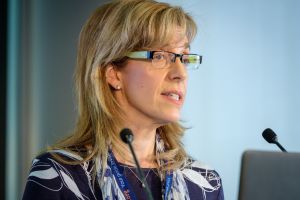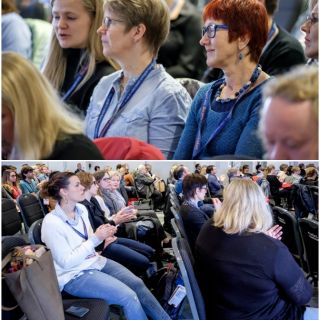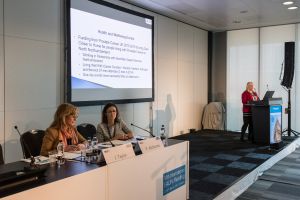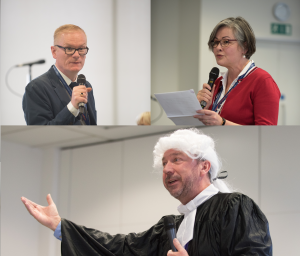18th EAUN Meeting in London

Over 350 urology nurses from Europe and around the world gathered in London to learn updates and practical insights in a programme that featured practical workshops, courses, as well as state-of-the-art lectures on cancer management and follow-up, kidney failure and rare diseases, among other topics.
The following report is an overview of the wide-ranging programme that took place from March 25 to 27:

©2017 Edwin van Wijk
Following the welcome remarks by Stefano Terzoni (EAUN Chair), Chris Chapple (EAU Secretary General) and Jane Taylor (BAUN Honorary President), the threeday event acknowledged the difference between specialist nursing and nursing specialists during the plenary session. In the first session on Saturday morning the potential role of specialist nurses, nurse-led clinics and future challenges were explored by Jerome Marley (IE) and Philippa Aslet (UK). In a session on Sunday afternoon, organised in collaboration with the British Association of Urology Nurses (BAUN), current issues in urological care were taken up. Chaired by Jane Taylor and Paula Allchorne (EAUN Board member) the session noted that urological nurses are using advanced nursing practices throughout Europe despite the differences in culture and clinical approaches.
 Jane Brocksom opened the session by highlighting the importance (despite common perceptions and the UK’s decision to exit the EU) of European links, cross-country communication and collaboration, which are essential to foster relations and ensure the advancement of research, education and networking of clinical practice. The next three speakers all demonstrated in their presentations how nurses in advanced roles can provide cost-efficient, effective, patient-centred care that would also ensure quality in nursing care. Using research- based medicine to design and re-model services, they also emphasise the importance of collaborative work.
Jane Brocksom opened the session by highlighting the importance (despite common perceptions and the UK’s decision to exit the EU) of European links, cross-country communication and collaboration, which are essential to foster relations and ensure the advancement of research, education and networking of clinical practice. The next three speakers all demonstrated in their presentations how nurses in advanced roles can provide cost-efficient, effective, patient-centred care that would also ensure quality in nursing care. Using research- based medicine to design and re-model services, they also emphasise the importance of collaborative work.
In the following three patient care improvement presentations (by Pauline Bagnall, United Kingdom, Lone Aarvig and Kathrine Melchiorsen both from Denmark) the speakers highlighted the very similar aims despite the equally different approaches by specialist nurses to improve patient care, regardless of their country of origin. Obviously, we all strive to achieve this common goal despite the variations across Europe. As the EU motto states “In varietate concordia” or ‘United in diversity.’
A remarkable range of topics that cover many key issues in urological nursing were presented, as well as two collaborative EAUN-European School of Urology (ESU) courses which addressed the ‘learning curve in urological surgery’ and ‘urinary diversion’.
Urostomy and urinary diversion
The latter, the ESU Course on “Urostomy/urinary diversion: Clinical pathway for the management of patients who undergo a cystectomy”, drew a high attendance and was well appreciated. The entire patient care pathway was examined; ranging from pre-operative counselling to side-effects and post-surgical follow-up. One of the presenters, Kyla Rogers (UK, Mitrofanoff Support President) gave good learning insights from the patient perspective. Health care workers did not take her seriously and she had to wait for a long time before she finally got help. Her case is a good example that second opinion has benefits and that a health care worker should encourage patients in difficult cases to ask for a second opinion. It is frustrating for a urologist, for instance, not to be able to help a patient, and asking a colleague for some help should not be perceived as failure.
Follow-up after surgery
There is a high rate of cystectomy patients who get complications. Thus, side-effects over time such as erectile dysfunction, sexual problems for women and fatigue should be properly attended to. The patients need follow-up by an oncology nurse or other specialist nurses following surgery. Finally, the need for investing in further research regarding side-effects over the long-term became apparent, and this topic should be emphasised in the training and education of health care professionals, particularly doctors.

In the thematic sessions important oncology topics were covered such as testicular cancer, NMI bladder cancer, a survivorship care programme in surgical oncology, lymphedema after lymph node dissection and many others.
In the session on testicular cancer care, the delegates were given updates on the importance of supporting men at key stages of their disease and about ethical challenges that health professionals encounter with this type of patients.
Nurses looking for practical topics for their daily practice benefited from the sessions which tackled topics such as nursing solutions in difficult cases, challenges with urine incontinence, acute and chronic kidney failure, challenges in testicular cancer care, the urology nurse as patient advocate, stoma care of a patient with trisomy and autistic tendencies, among many other issues.
This year, the state-of-the-art lectures covered challenges in nursing practice such as the counselling of patients with acute and chronic kidney failure, drug resistant micro-organisms, and the issue of patient education in a challenging environment (or poor patient literacy). Furthermore, the delegates were informed on developments such as a Danish nurse-driven survivorship clinic and urodynamic studies with air-filled catheters performed in Belgium (shown during the video session on Sunday).

Guidelines session
In a well-attended Guidelines session on Saturday, Susanne Vahr updated the delegates on the latest research regarding intermittent catheterisation. She handed over a new edition of the EAUN guidelines on intermittent catheterisation (a very handy pocket version) to Maria Aberg Hakansson of Wellspect HealthCare, who supported the production of the pocket guidelines. Participants were offered copies of the pocket guidelines besides learning key take-home messages.
 Debby Watson (NL) and Brian McGowan (IE) debated the contentious question of whether patients arecapable of choosing or deciding on the best treatment, an issue which sparked a lot of discussion and cordial laughter. The session was formatted in the style of the ‘Westminster House of Commons’ debate where only ‘Hear, hear’ comments can be heard. This new session format was very much appreciated and will be repeated next year in Denmark.
Debby Watson (NL) and Brian McGowan (IE) debated the contentious question of whether patients arecapable of choosing or deciding on the best treatment, an issue which sparked a lot of discussion and cordial laughter. The session was formatted in the style of the ‘Westminster House of Commons’ debate where only ‘Hear, hear’ comments can be heard. This new session format was very much appreciated and will be repeated next year in Denmark.
E-health and empowerment was another interesting and current topic. The use of a webcam as a consultation tool was of course unheard 20 years ago. But, today, informing patients for them to go online and download hospital instructions and information is now quite normal, and which leads to reduced paper use and postal costs.
Using a webcam system to provide language translator service works efficiently in medical consultations. However, the electronic world also presents some challenges since whenever patients consult “Dr. Google” the information they get may no Debby Watson (NL) and Brian McGowan (IE) debated the contentious question of whether patients are always be accurate. This can lead to potential conflicts or misunderstanding between the patient and medical professionals. The key messages in the session reminded the delegates of the crucial and yet tricky role of electronic tools.
For nurses working in the operating theatre there was also a lot to gain from this meeting, particularly in sessions such as in the ESU course on the learning curve in urological robot-assisted surgery and a hands-on robotics skills training.
Robotic skills training
A first, the ERUS-ESU hands-on training course for nurses on Robotic skills and communication was held with the support of Mimic Technologies, 3D Systems and Stan Institute. The session took up the demanding team work in the operating room and made the participants very much aware of each other’s role and the importance of communication. Moreover, it was possible to test and improve psychomotor skills by performing various team exercises. The course was very successful and to follow up on this success the EAUN is currently organising a three-day meeting on robotics in Bruges, Belgium in conjunction with ERUS17.
Overall, the 17 posters and presentations in the two poster sessions were of a very high level and provided evidence-based results, as well as practical information that could be used in every day practice. This fulfils the session’s goal to serve as a platform for knowledge sharing. All presented abstracts, posters and lecture slides can be found in the Resource Centre at www.eaun17.org.
The EAUN Scientific Committee is working to have equally interesting poster sessions in Copenhagen and is ready to provide support to all colleagues who are interested to join the abstracts sessions next year. Don’t miss this opportunity!
Abstract submission is open from 1 July until 1 December 2017 at www.eaun18.org
For more photos of the meeting check the Facebook photo album.

